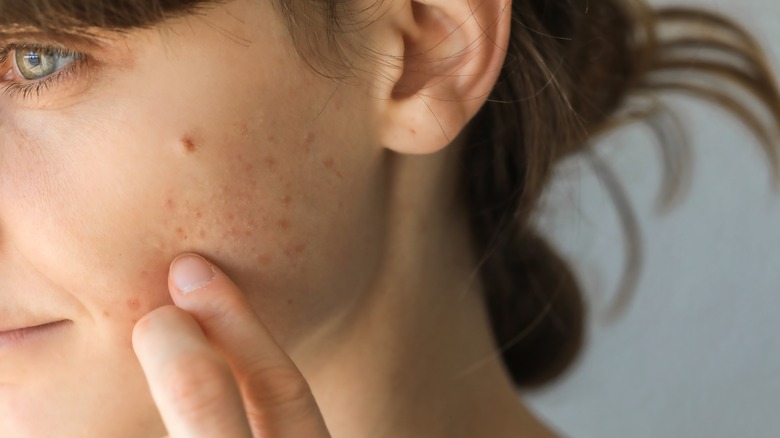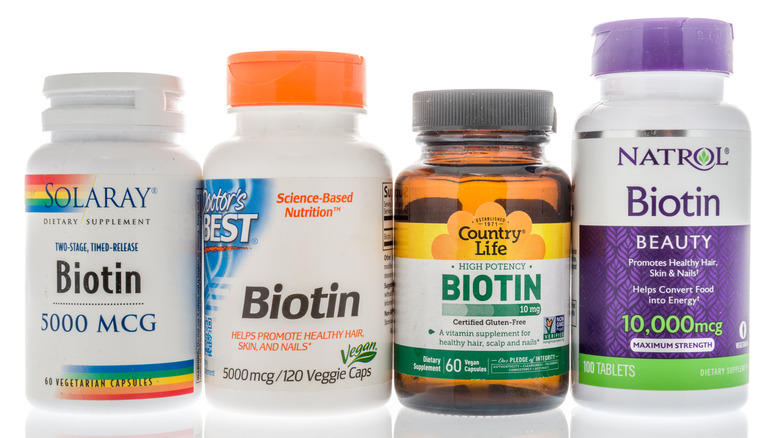Is There A Link Between Taking Biotin And Getting Acne?
Biotin, or vitamin H, is best known for its beneficial effects on the skin, hair, and nails. However, these marketing claims lack scientific proof, said dietician Courtney Barth in an interview with Cleveland Clinic. "...some people find that taking a biotin supplement helps them boost hair and nail growth. It's usually not harmful to try biotin for thicker hair or healthier nails," she added.
What many consumers are not aware of is that biotin plays a crucial role in energy metabolism. This compound helps your body break down and process sugar, amino acids, and fats, according to the National Institutes of Health (NIH). Moreover, it regulates gene expression, cell communication, and other biochemical processes.
A deficiency in this nutrient can lead to hair loss, skin rashes, and other problems, says the NIH. Biotin supplements won't necessarily address these issues, but biotin may help prevent deficiencies. Whatever your reasons for taking supplemental biotin, make sure you understand its potential risks. Most experts agree that biotin is safe, even when used in high doses, but some people may experience digestive distress, notes Barth.
Anecdotally, this dietary supplement may also cause acne breakouts, although there's not enough evidence to confirm it. But if you're prone to acne, it makes sense to avoid any triggers. With that in mind, let's see what the research says about biotin supplements and acne.
Does biotin cause acne breakouts?
Biotin is usually well-tolerated and has few or no side effects. "If you take in more biotin than you need, your body doesn't store it," dietician Courtney Barth told the Cleveland Clinic. But even so, you might have heard that biotin supplements can trigger or worsen acne. The logic behind this claim is that biotin interferes with the absorption of pantothenic acid, or vitamin B5, a nutrient that promotes skin health and fights inflammation, explains a 2009 review published in the Journal of Nutrition.
However, these beliefs are based on anecdotal evidence. In fact, biotin may help treat comedonal acne by regulating sebum production, according to clinical research in the Italian Journal of Dermatology and Venereology. In another study, scientists investigated the effects of a topical cream versus a dietary supplement containing biotin, zinc, probiotics, and other nutrients. The latter treatment caused greater improvements in acne symptoms than the cream. What's more, biotin may help reduce skin irritation and flaking, according to a 2009 review in the Journal of Nutrition.
But again, the opinions are mixed. For example, nutritionist Vanessa Lee told Who What Wear that biotin can cause acne breakouts, especially when administered in high doses. Other experts interviewed by Who What Wear support these claims, saying that biotin supplements increase keratin production, which can result in hyperkeratosis, a risk factor for acne.
Should you take biotin if you're prone to acne?
Who What Wear interviewed several dermatologists, dieticians, and other health experts, and they all agreed that high biotin intakes may cause acne. "It's hard to say how much biotin is needed in order to trigger acne because there are so many factors to consider, like one's sensitivity to the biotin-B5 equilibrium and also the individual's keratin production levels," said registered dietician-nutritionist Sarah Koszyk.
Your best bet is to stick to the recommended daily dosage, which is around 30 micrograms per day, according to the NIH. If you're under 18 years old, try not to exceed 25 micrograms per day. Also, note that biotin occurs naturally in a wide range of foods, so you may not need a supplement at all.
For example, 3 ounces of cooked beef liver provides 103% of the recommended daily biotin intake, reports the NIH. Canned salmon, eggs, sunflower seeds, almonds, tuna, and some vegetables contain this nutrient, too. Cornmeal and soybeans deliver about 60% of the recommended daily amount of biotin per serving (3.5 ounces), and they're ideal for vegans and vegetarians, notes a 2014 research article in the International Journal of Analytical Bio-Science.
All in all, it's not necessary to take biotin supplements unless you're at risk for deficiencies. As far as acne goes, there's no clear link between biotin and skin breakouts, but you may stop taking your supplements for a while to see if your symptoms improve.


